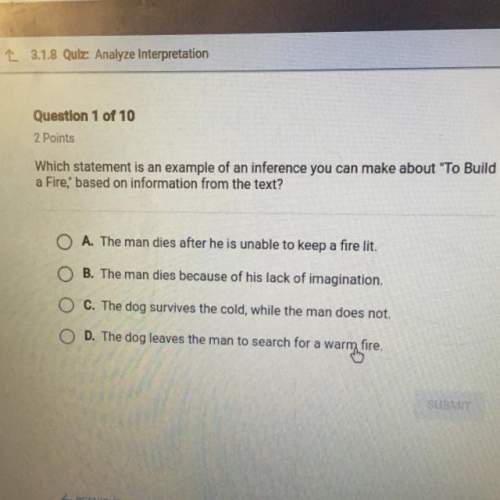
Part A At the beginning of "Zlateh the Goat," what does the narrator imply about Reuven? A. He was no as successful as the rest of the townspeople B. He is thinking about working as something other than a furrier. C. He is worried about what the butcher will do with the goat. D. He has not earned enough money to spend on the upcoming holiday. Part B Which excerpt from the passage best supports the answer to Part A? A. “Such a sum would buy Hanukkah candles, potatoes and oil for pancakes, gifts for the children, and other holiday necessaries for the house." B. “For Reuven the furrier it was a bad year, and after long hesitation, he decided to sell Zlateh the goat.” C. “The peasants complained that because of the dry weather there would be a poor harvest of winter grain.” D. “Newgrass sprouted, and the peasants sent their cattle out to pasture.”

Answers: 2
Another question on English

English, 21.06.2019 19:10
Read the passage from animal farm. one sunday morning squealer announced that the hens, who had just come in to lay again, must surrender their eggs. napoleon had accepted, through whymper, a contract for four hundred eggs a week. the price of these would pay for enough grain and meal to keep the farm going till summer came on and conditions were easier. when the hens heard this, they raised a terrible outcry. they had been warned earlier that this sacrifice might be necessary, but had not believed that it would really happen. they were just getting their clutches ready for the spring sitting, and they protested that to take the eggs away now was murder. for the first time since the expulsion of jones, there was something resembling a rebellion. led by three young black minorca pullets, the hens made a determined effort to thwart napoleon's wishes. their method was to fly up to the rafters and there lay their eggs, which smashed to pieces on the floor. napoleon acted swiftly and ruthlessly. he ordered the hens' rations to be stopped, and decreed that any animal giving so much as a grain of corn to a hen should be punished by death. the dogs saw to it that these orders were carried out. for five days the hens held out, then they capitulated and went back to their nesting boxes. nine hens had died in the meantime. their bodies were buried in the orchard, and it was given out that they had died of coccidiosis. whymper heard nothing of this affair, and the eggs were duly delivered, a grocer's van driving up to the farm once a week to take them away. which detail from the passage supports the claim that this is an allegory for the great purge? the hens holding out for five days but capitulating the eggs being delivered to the grocer the protesting hens being intentionally starved coccidiosis spreading on the farm
Answers: 2

English, 22.06.2019 00:00
The overwhelming majority of the peoples and nations of the world today want to live in peace
Answers: 1

English, 22.06.2019 10:00
Where did madame loisel likely lose the necklace? a: at the ministers house b: in the taxi c: on the walk home d: the text gives no hint
Answers: 2

English, 22.06.2019 11:00
Which statement best explains coelho's choice in the alchemist to have the boy robbed as soon as he arrives in tangiers? it reveals how working for the crystal merchant is part of the boy's personal legend. it illustrates how personal legends can change quickly if one is not careful. it shows how the boy makes poor choices and needs much guidance on his journey. it highlights the dangers of being in a new and unknown country.
Answers: 3
You know the right answer?
Part A At the beginning of "Zlateh the Goat," what does the narrator imply about Reuven? A. He was n...
Questions









Computers and Technology, 13.10.2019 07:01

Biology, 13.10.2019 07:01

Mathematics, 13.10.2019 07:01

Biology, 13.10.2019 07:01

Mathematics, 13.10.2019 07:01


Mathematics, 13.10.2019 07:01

Mathematics, 13.10.2019 07:01




Mathematics, 13.10.2019 07:01




